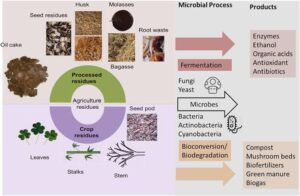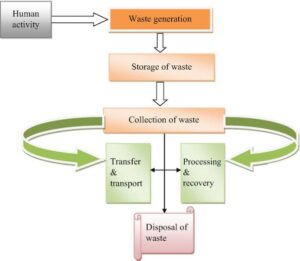Back to: MICROBIOLOGY 400 LEVEL
Welcome to class!
Hello, superstar! It’s great to see you back and ready to learn. Today’s lesson is super relevant, especially in Nigerian cities where waste is a growing concern. We’ll be learning about Microbial Roles in Solid Waste Treatment. Imagine if tiny living things you can’t even see could help turn heaps of refuse into something useful—like compost for farming or even cleaner surroundings. Let’s see how microbes do it!
Microbial Roles In Solid Waste Treatment
Every day, homes, markets, schools, and industries generate solid waste—things like leftover food, paper, plastic, and farm waste. If not properly managed, this waste piles up, smells, and pollutes the environment. But here’s the good news: microbes can help clean it all up!

1. Types of Solid Waste Microbes Can Treat
Microbes mostly help in treating biodegradable or organic solid waste. These are materials that can naturally decay, like:
Food leftovers
Vegetable peels
Paper
Plant and animal remains
Farm waste (manure, crop residues)
These wastes are full of nutrients that microbes love. When microbes act on them, they break them down into simpler, useful substances.
2. How Microbes Help
Decomposition: Microbes such as Bacillus, Aspergillus, and Actinobacteria break down complex waste materials into simpler organic matter.
Composting: Microorganisms turn waste into rich compost. This compost improves soil fertility for farming.
Methane production: Some microbes (anaerobic bacteria) break down waste without oxygen and produce biogas, which can be used as fuel for cooking and lighting.
Odour reduction: Microbes help remove the bad smell that comes from waste by breaking down the smelly compounds.
3. Aerobic and Anaerobic Treatment
Aerobic treatment: Microbes work in the presence of oxygen to break down waste. This is commonly used in composting piles or waste pits.
Anaerobic treatment: Microbes work without oxygen and produce methane gas in the process. This is used in biogas digesters, like those in rural farming communities in Nigeria.

Real-life Nigerian example: In states like Oyo, Ogun, and Kaduna, agricultural projects use composting methods with the help of microbes to treat market and farm waste. Some farms even use biogas digesters powered by microbial activity to produce gas for cooking, reducing the need for firewood.
Summary
- Microbes play a major role in treating biodegradable solid waste.
- They decompose organic matter into useful products like compost.
- Microorganisms like Bacillus and Aspergillus are key players.
- Compost made from waste improves soil health and farm yield.
- Anaerobic microbes help produce biogas from solid waste.
- Microbial activity helps reduce odour and pollution.
- Aerobic treatment uses oxygen and is common in composting.
- Anaerobic treatment works without oxygen and produces methane.
- Microbial waste treatment is used in Nigerian farms and markets to manage waste sustainably.
Evaluation
- What types of solid waste can microbes help treat?
- Name one aerobic and one anaerobic method used by microbes.
- How does microbial treatment of waste benefit farmers?
You’ve just discovered how nature’s smallest workers can clean our environment and support agriculture at the same time. You are becoming an environmental change-maker—keep learning, keep shining. With Afrilearn, your journey to success is unstoppable. See you next class!
